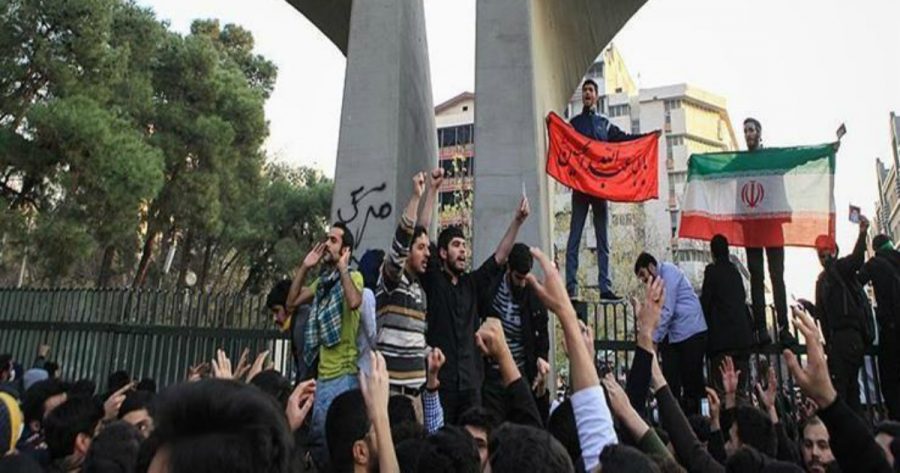
It seems that Iran, its allies, and its Shiites in the region have seen better days. They are experiencing existential and trying challenges following the United States decision to flip the script. The rug was pulled from underneath them causing their plans to fall like dominoes from Iraq to Lebanon as well as Yemen.
Starting from Iraq, Iraqi militias affiliated with Iran have been heavily infiltrating Iraqi public institutions as the primary means that Iran seems to be adopting in response to the increasing exposure they are suffering from politically and in terms of security. This exposure is the direct result of the ongoing Iraqi uprising as well as the recent assassination of the Quds Force Commander Qassem Soleimani.
Read more: This is What Hezbollah Need from Hassan Diab’s Cabinet!
On this matter, an Iraqi official revealed to “Nidaa Al-Watan” that the Iranian Leadership has instructed ranking officials in the Iraqi Cabinet in coordination with the acting government, to provide administrative and strategic measures to ensure the entry of large numbers of militia members into the public sector through military, civil, or even contrived jobs.
This step, according to the Iraqi official, does not mean that Iran’s supporters are not already within the public administration and its institutions, they are there. However, the situation years ago during the Syrian revolution and the rise of ISIS called for, by Commander Qassem Soleimani, the creation of militias that ideologically linked to the Iranian Revolutionary Guard under ‘Wilayat Al-Fakih’ and are commanded by it. The official pointed out the financing of these militias was provided by the Iraqi government by being included the general budget under the section related to financing the PMF (Popular Mobilization Front).
Iran will not confront Washington
Contrary to predictions, the Iranian leadership will not go towards the option of military confrontation with Washington. This is because the official Iraqi position including that of Shiite authorities in Najaf, is not to back any confrontation with the United States’ presence since that would threaten the entire political system that was built atop the Baath parties fallen regime. The American-Iranian conflict will therefore remain within the confines of skirmishes as political authorities in Iraq today will not venture their newly gained positions that they attained thanks to the Americans in the first degree, and to Iranians to a second degree.
The Iraqi uprising is the cause for this upset in the balance of power. It raised concerns over the change in structure of the regime. The position within the Shiite religious leadership attempts to balance between supporting popular reforms and forming a new cabinet and parliament on one hand, and maintaining the structure of the post-2003 political system on the other hand. This would prevent a political coup against the regime and provide necessary reform to ensure continuity and strength.
Iran’s soft War
The strategy adopted in Iraq is not different in its core from that in Lebanon by Iran, the main goal is to maintain order and power, whether in Lebanon or Iraq. In interpretation of the aftermath of the assassination of Soleimani, it can be observed that Iran is transitioning from a full-fledged military war into a soft war. The assassination of Soleimani was the key event that ended the so-called Iranian military arms, and enhanced the model of control through governmental institutions whether in Iraq, Lebanon, or Syria to a larger extent. This does not mean that infiltration of governmental institutions was not present in Lebanon. However, it means that the military component has become the lesser factor after the loss of its main advocate General Soleimani.
The Lebanese cabinet: A slap in the face!
The newly formed Lebanese cabinet was not the slap in the face of the US president Donald Trump as Nabil Kaouk, a Hezbollah superior, claimed it would be. It may be a slap in the face of the Lebanese people according to the massive protests in the streets. The key takeaway from Kaouk is that this is not a US opposition government. The appointment of Imad Hobbalah, who holds a US passport as minister of industry and whose wife is also a green card holder, was something Hezbollah intended for their representative in the government. The United States may not care for this detail, but Hezbollah surely took this aspect into consideration when selecting their representative.
Hezbollah and the crisis partnership
Regarding to the economic and financial crisis, Hezbollah was, at least, a sponsor of its creation; at most, one of its main causes through forcing Lebanon to endure the sanctions tied to their Iranian political partnerships, and through protecting and sponsoring the system of corruption within the government. Hezbollah realize that the current administration, that they have controlled and directed, has become one of their main centers of power. This time around, they are unable to practice the deception they exercised since 2005, which was their asceticism when it comes to security and politics resigning themselves only to the cause of liberation and martyrdom. This is no logic feasible. They are no longer able to govern without responsibility. They are no longer able to dodge the responsibility and feign impartiality towards the Diab’s newly formed cabinet. This is especially true as it was described by MP Hassan Fadlallah as the best government Lebanon has seen since 1989.
What will changes in Hezbollah’s priorities entail?
Unchanged is the priority to protect the current political system and maintain power, if not enhance it. The militia was able, in the past, to ensure the expansion of Hezbollah’s authority within the system. However, this function has been severely reduced if not completely lost. The militia is no longer a viable means to protect power and control. This is because the current administration is facing a crisis different in nature than those before. These crises are financial, monetary, and relating to deep rooted corruption.
How Hezbollah will deal with these challenges remains unclear as it is causing them confusion as to what direction they will move or what their slogan will be during that time. Resistance is no longer a solution nor is it a distraction from their inability to meet their bases’ basic living requirements; not to mention the new strategic requirements that have risen with the emerging Russian intervention within Syria and Israel.
Hezbollah’s new role
The new challenges imposed by the uprising in Lebanon and the state of crisis within the administration will impose a change in the role and tools of Hezbollah. Perhaps one of the biggest challenges for them is how they will deal with and reduce corruption. How will they assert themselves are part of the solution when they are surrounded by evidently corrupt allies as their own base frequently asserts?
Has the usefulness of the Shiite political duo that has long covered for Hezbollah’s activities and expansion run its course? or is it still able to continue through the next stage? Can Hezbollah convince the Lebanese people of their new reformist role without sustaining necessary yet heavy sacrifices?
These questions may not be on the agenda of Hezbollah who might move in a different direction, but avoiding the problem of corruption and reducing it will spell the tragic end of not only Lebanon, but Hezbollah themselves.

